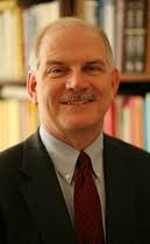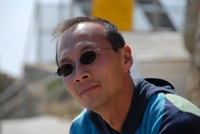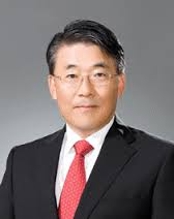IEEE ICCC 2014 Keynote Speakers
 H. Vincent Poor
H. Vincent Poor
Professor, Princeton University
Privacy of Information Sources: Fundamental Limits and Tradeoffs
The ubiquity of technologies such as on-line data repositories, biometric identification systems, smart electricity meters, etc., has created new challenges in information security and privacy. Information theory provides fundamental limits that can guide the development of methods for addressing these challenges. This talk will first describe a fundamental information theoretic framework for examining, in a general setting, the tradeoff between the privacy of data and its measurable benefits. This framework will then be used to investigate this tradeoff in several problems arising in the applications noted above.
Biography: H. Vincent Poor is the Michael Henry Strater University Professor at Princeton University, where is also the Dean of the School of Engineering and Applied Science. His research interests are primarily in wireless communications and related fields such as social networks and smart grid. An IEEE Fellow, Dr. Poor is a member of the U.S. National Academy of Engineering and the U.S. National Academy of Sciences, and a foreign member of the Royal Society of the U.K. Recent recognition of his work includes the 2014 URSI Booker Gold Medal, and honorary doctorates from several universities, including an honorary Doctor of Science in Technology from Aalto University in 2014.
 David Tse
David Tse
Professor, Stanford University
Information Theory for High Throughput Sequencing
Extraordinary advances in sequencing technology in the past decade have revolutionized biology and medicine. Many high-throughput sequencing based assays have been designed to make various biological measurements of interest. A key computational problem is that of assembly: how to reconstruct from the many millions of short reads the underlying biological sequence of interest, be it a DNA sequence or a set of RNA transcripts? Traditionally, assembler design is viewed mainly as a software engineering project, where time and memory requirements are primary concerns while the assembly algorithms themselves are designed based on heuristic considerations with no optimality guarantee. In this talk, we outline an alternative approach to assembly design based on information theoretic principles. Starting with the question of when there is enough information in the reads to reconstruct, we design near-optimal assembly algorithms that can reconstruct with minimal amount of read information. We implement the algorithms in multi-core software and test them on real data to compare with state-of-the-art software in the field.
Biography: David Tse received the B.A.Sc. degree in systems design engineering from University of Waterloo in 1989, and the M.S. and Ph.D. degrees in electrical engineering from Massachusetts Institute of Technology in 1991 and 1994 respectively. From 1994 to 1995, he was a postdoctoral member of technical staff at A.T. & T. Bell Laboratories. From 1995- 2014, he was on the faculty in the University of California at Berkeley. He is currently a professor at Stanford University. He received a 1967 NSERC graduate fellowship from the government of Canada in 1989, a NSF CAREER award in 1998, the Best Paper Awards at the Infocom 1998 and Infocom 2001 conferences, the Erlang Prize in 2000 from the INFORMS Applied Probability Society, the IEEE Communications and Information Theory Society Joint Paper Awards in 2001 and 2013, the Information Theory Society Paper Award in 2003, the 2009 Frederick Emmons Terman Award from the American Society for Engineering Education, a Gilbreth Lectureship from the National Academy of Engineering in 2012, the Signal Processing Society Best Paper Award in 2012 and the Stephen O. Rice Paper Award in 2013. He is a coauthor, with Pramod Viswanath, of the text "Fundamentals of Wireless Communication", which has been used in over 60 institutions around the world.
 James Won-Ki Hong
James Won-Ki Hong
Professor, Pohang Univ. of Science and Technology
Shaping the Future with ICT and Internet of Things
The rapid advances in networking and computing technologies have brought the first big wave of Internet revolution since the 90’s. Combined with this, the latest mobile networking, smartphone and cloud computing technologies led to the second big wave of mobile big bang. Internet of Things (IoT) is the latest big wave impacting the way we live, travel, work and enjoy. Apple, Google, Amazon, Facebook and many other global Internet players have emerged and have been introducing numerous innovative services and open ecosystems. These advances and challenges have greatly affected the telecommunications industry over the past decade. This talk will explain the challenges faced by telcos around the world and how they have been changing, including KT. The latest information and communications technologies (such as SDN/NFV, LTE/LTE-A/5G) will be described. Emerging services such as Smart IPTV, Digital Goods, Clouds, ICT Convergence (such as Smart Home, Smart Energy, e-Healthcare), and Internet of Things will be described along with their R&D challenges.
Biography: James Won-Ki Hong is Professor in the Dept. of Computer Science and Engineering at Pohang Univ. of Science and Technology (POSTECH). He had worked as the Chief Technology Officer and Senior Executive Vice President for KT (Korea Telecom), the largest telecommunications company in Korea from March 2012 to Feb. 2014, where he was responsible for leading the R&D effort of KT and its subsidiary companies. He was Chairman of National Intelligence Communication Enterprise Association, and Chairman of ICT Standardization Committee in Korea. His interests include network innovation, such as software-defined networking (SDN) and network function virtualization (NFV), cloud computing, mobile services, IPTV, ICT convergence technologies (e.g., Smart Home, Smart Energy, Healthcare), and Internet of Things (IoT). James had served as the Head of Dept. of Computer Science and Engineering, Dean of Graduate School for Information Technology, Director of POSTECH Information Research Labs (PIRL) and Head of the Division of IT Convergence Engineering at POSTECH. He was also co-founder and CTO of Netstech, a Palo Alto, USA-based startup developing network integrated ultra-dense, blade servers from 2000 to 2002. Over the past 20 years, James has been an active volunteer in various committees in IEEE, ComSoc, and KICS. He has served as Steering Committee Chair of IEEE NOMS, IM and APNOMS, as well as Chair of IEEE CNOM (ComSoc Committee on Network Operations and Management) and KNOM. He has also been serving as EiC of Wiley’s International Journal of Network Management (IJNM) and ComSoc Technology News (CTN) as well as an editorial member of the IEEE Transactions on Network and Service Management (TNSM), Elsevier’s Journal of Network and Systems Management (JNSM) and Journal of Communications and Networks (JCN). James received his HBSc and MSc degrees in Computer Science from the University of Western Ontario, Canada in 1983 and 1985, respectively, and the Ph.D degree in Computer Science from the University of Waterloo, Canada in 1991.
 Ping Zhang
Ping Zhang
Professor, Beijing University of posts and telecommunications
5G, Vision and Future Works
Driving largely by mobile internet and internet of things, 5G and future wireless networks are facing the challenge of higher user experienced data rates, lower latency, higher traffic volume density and higher connection density. The traditional cellular technology has been difficult to meet the requirements. Unlike the previous four generation of cellular technology, 5G and the future networks will be high densification and highly integrative: tying any new air interface and spectrum together with current cellular networks and WiFi to provide higher capacity. To support this, the integrative wireless network architecture and new technology should be studied to provide energy-efficient, spatial densification, spectral aggregation, and backhaul densification network. This speech will discuss all of these topics, identify key challenges and candidate technologies for future research, and introduce the current activities of 5G within China.
Biography: Ping Zhang is Director of State Key Laboratory of network and switching technology. Prof, Zhang focuses on wireless communication, new technologies for cognitive radio, cognitive wireless networks, TD-LTE, MIMO, OFDM and etc. He is Executive Associate Editor-in-chief on information sciences of Chinese Science Bulletin, a Member of next-generation broadband wireless communication network in National Science and Technology Major Project committee, a Member of the 5th Advisory Committee of NSFC(National Natural Science Foundation of China), the Chief Scientist of “973” National Basic Research Program of China, member of MOST(The Ministry of science and technology) 863 Program Expert team, member of MOST IMT-Advanced 5G Expert team, He applied over 150 patents with 131 authorized. 7 proposal accepted as International Standard. He received award of National Science and Technology Advance Prize, Award of National Science and Technology Invention Prize, the Provincial Science and Technology Awards many times,and was given the Title of Outstanding Scientific and Technological Workers in 2010.